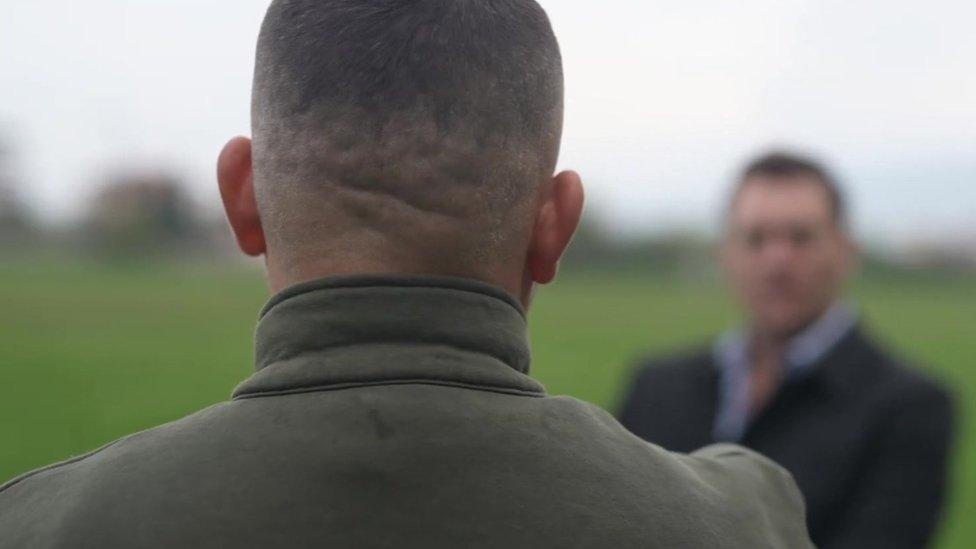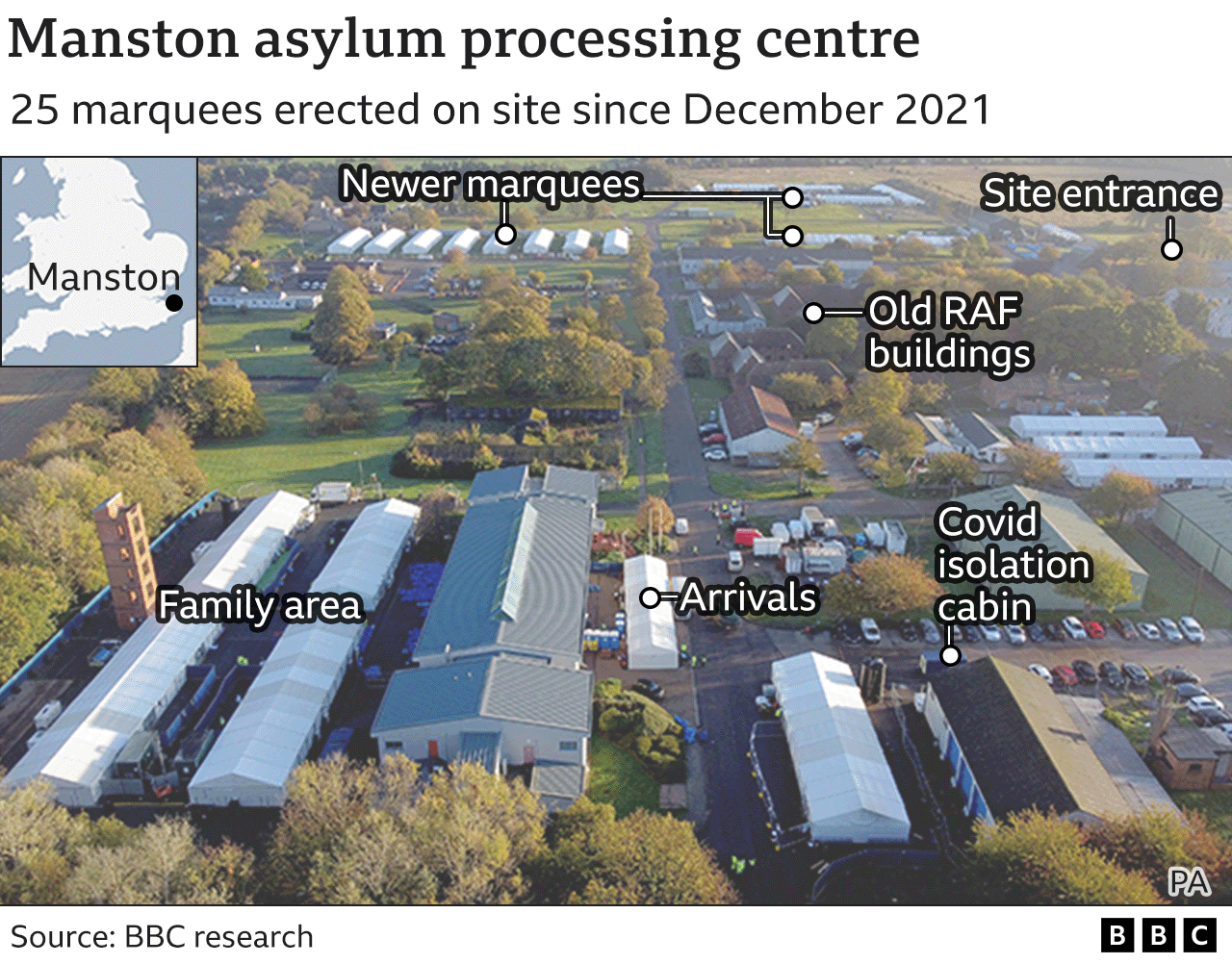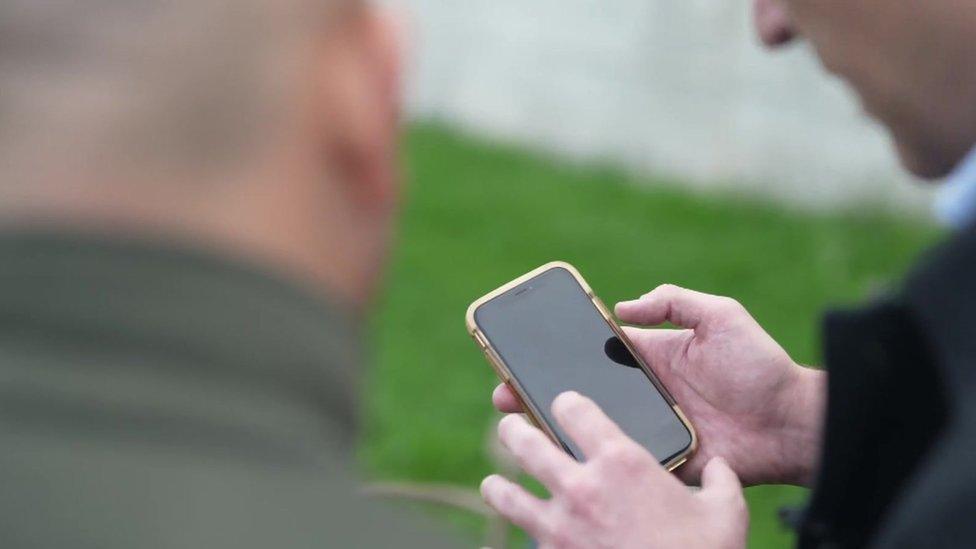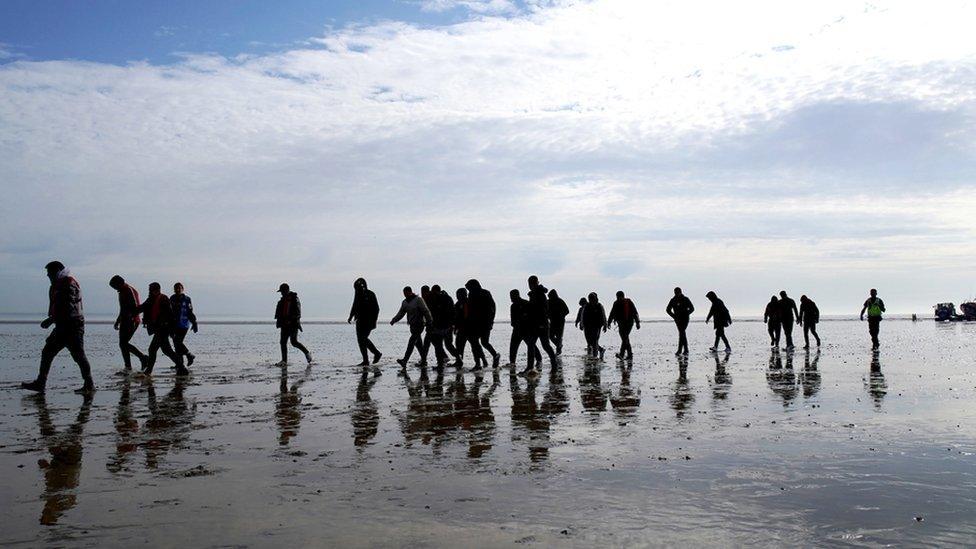Albanian migrant: 'I wish I'd never tried to enter the UK illegally'
- Published
Watch: Albanian man films dinghy crossing on the English channel after paying people smugglers for the trip
"I didn't seek asylum. I told them I was an economic migrant," said Artan. "They gave us plastic bags with our belongings; I was told tomorrow morning you will arrive in Tirana."
Unlike other Albanians who have entered the UK illegally on small boats and claimed asylum he was quickly sent home.
He had paid Kurdish people smugglers around £3,500 ($4,169) for the perilous trip across the English Channel, borrowing the money from friends and family.
We met Artan in an industrial suburb of the Albanian capital. It isn't his real name as his identity needs protecting for fear of reprisals. In his early 30s, he cut a downbeat figure.
"The traffickers were armed with knives and pistols. They were repeatedly threatening us, saying not to film anything and not even to smoke cigarettes as the light would give away our location."
Despite the threat, he managed to record a few shots from his journey across the Channel.

Artan says he knows he was breaking UK law by trying to enter illegally
Leaving Albania, especially for the UK or Germany, is an aspiration shared by many young people here. More than 12,000 Albanians have arrived in the UK on small boats this year, the largest group of migrants to try to enter the country that way. On average more than half of Albanians are given asylum.
"The journey across the Channel was torture," Artan remembered. It was cold, stormy and incredibly scary.
"A French police boat appeared 20 minutes into our journey. They accompanied us from a distance of maybe 200m, just observing, which reassured us. They stayed for three hours, maybe more. Then we crossed into UK waters and called British police."
Artan recalls how the British authorities helped them get to shore safely. "They told us they were coming to get us, that we mustn't panic. They behaved well and seemed very welcoming and polite. We jumped to the UK police boat where we got life vests."
Like the thousands of others who have crossed the Channel on small boats this year, he ended up in the Manston reception centre in Kent.
At the peak of the small-boat crisis in October, 4,000 people were being housed on a site where the safe occupancy level is 1,600. The numbers were so high that the Home Secretary Suella Braverman controversially denounced the arrival of Channel-crossing migrants as an "invasion".

Artan rejected that characterisation but made no secret of why he had travelled to the UK.
"I said to the woman interviewing me: 'I know I have entered illegally, but I have not come here for fun. I have come because I want to work. I didn't seek asylum.'
"I told them I was an economic migrant. My father is disabled. For 15 years he's been living on a disabled person's pension, not enough to buy his own medication."
I put it to him that he knew he'd reached the UK illegally.
"Yes, of course I did. If you enter a foreign country without proper documentation, visas, stamps, of course you are entering illegally."
Most Albanians we have met in Albania complain that legal routes of entry into the UK are too difficult to access.
He added: "Yes there are legal ways, but I was in a hurry. I went for the quickest and cheapest way. The visa should be cheaper but I needed help with the application and people charge more for that than the dinghy journey."
One of the reasons Artan was deported was that he was honest about his reasons for travelling to the UK. He did not try to claim asylum, he insisted he was there to work.
He had little notice he was being flown home: "They took us out, we were surrounded by police."
"At that moment I was so upset I can't describe it. I felt like my brain was exploding and I could do nothing about it all."

Artan recorded videos as he crossed the English Channel on a small dinghy
Artan readily admits he broke UK law and that was why he was deported. As well as being flown home, he is now banned from other European nations for the next three years.
He said: "I cried for the entire journey, from the moment I got on that bus and realised I was being deported, until I arrived in Albania."
The issue of small boat crossings has led to furious debate in the UK, with some claiming the problem has been overstated, while others think it is a full-blown crisis.
The one thing that almost everyone agrees on, is that the only people really benefiting from the status quo are the smuggling gangs, making huge profit from risking the lives of others.
Artan's own journey has left him thousands of pounds of debt and he bitterly regrets going.
He now believes that anyone else considering such a trip would be better off not leaving at all.
"It was an unimaginable terror. For certain I'd say don't choose the dinghy. If there is a legal way, with a visa, then yes leave, but please never think about leaving on a dinghy."
Joe Inwood reports for BBC Newsnight and Albana Kasapi for The World Tonight on BBC Radio 4.


What are your questions on small boat migrants and the asylum cases backlog? Email your questions to YourQuestions@bbc.co.uk, external
You can also send your questions in the following ways:
WhatsApp: +44 7756 165803, external
Tweet: @BBC_HaveYourSay, external
Or fill out the form below
Please read our terms & conditions and privacy policy
If you are reading this page and can't see the form you will need to visit the mobile version of the BBC website to submit your question or comment or you can email us at YourQuestions@bbc.co.uk, external. Please include your name, age and location with any submission.

- Published4 November 2022
